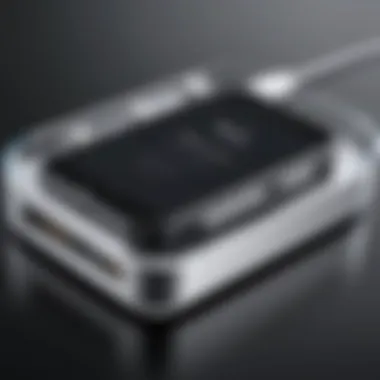Understanding iPhone Adapter Costs and Value


Intro
iPhone adapters serve multiple purposes, such as charging, data transfer, and audio connections. Their functionality often dictates their pricing. This article delves into the various types available, highlights their key features, and discusses market variations. By examining these factors, readers can gain insights that will aid in selecting the right adapter based on their specific needs and budget.
Product Overview
Description of the Product
The iPhone adapter is a small but crucial accessory that enables connectivity between the iPhone and other devices. Common types include the Lightning to USB adapter, Lightning to HDMI adapter, and the Lightning to headphone jack adapter. Each variant addresses different user needs, from charging to audiovisual connections.
Key Features and Specifications
Some prominent features that consumers should consider include:
- Compatibility: Ensure the adapter is compatible with your specific iPhone model.
- Data Transfer Speed: Look at specifications for data transfer rates. Faster speeds can enhance performance, especially for users transferring large files.
- Build Quality: Durable materials may affect longevity and performance. Ideally, a robust construction withstands daily use without fail.
- Brand Reliability: Consider whether to choose official Apple adapters or reliable third-party options, which may offer different price points without sacrificing quality.
In-Depth Review
Performance Analysis
Adapters can greatly impact the performance of your iPhone. Official Apple adapters typically promise high performance, as they are designed specifically for Apple devices. Third-party adapters, while often less expensive, can vary widely in performance. Reading reviews and conducting personal research on specific brands may provide insights into this aspect.
Usability Evaluation
When evaluating usability, consider how often you will use the adapter and in what contexts. For instance, a Lightning to HDMI adapter is ideal for presentations or watching videos on larger screens. Check for ease of connectivity—design aspects like length of cable, color coding, and plug orientation can impact user experience positively or negatively.
"Choosing the right adapter for your iPhone can enhance user experience and functionality significantly."
Preamble to iPhone Adapters
In today's digital age, accessories play a crucial role in enhancing the functionality of devices like the iPhone. Among these accessories, adapters are fundamental, providing necessary connections for various peripherals. This section aims to unravel the significance of iPhone adapters and their relevance in day-to-day usage, contributing to a more comprehensive understanding of their value and functionality.
Overview of iPhone Accessories
The iPhone, a leading smartphone on the market, relies on a range of accessories that enhance its capabilities. Among these accessories, adapters stand out due to their versatility. As technology evolves, the necessity for compatibility between devices increases. iPhone accessories include chargers, docks, cases, and adapters, each serving different purposes. While chargers ensure power supply, adapters facilitate communication between the iPhone and other devices.
In this ecosystem, adapters work as the bridge. For instance, the Lightning to USB adapter allows users to connect their iPhone to computers and chargers efficiently. Understanding this range of accessories and their functions is critical not just for tech enthusiasts but also for the average user relying on daily functionalities of their devices. Proper knowledge leads to more informed purchases, ensuring compatibility and quality.
Importance of Adapters
Adapters play an essential role in maximizing the usability of iPhones. Without them, users might encounter limitations in device connectivity. For example, Lightning to HDMI adapters are indispensable for users seeking to display content on larger screens. This can significantly enhance presentations or entertainment experiences.
Moreover, with the increasing trend toward wireless technology, many devices may be compatible only with specific connections, making adapters vital. With various formats, such as USB-C, HDMI, and audio jacks, the right adapter ensures seamless transitions between different technologies. Whether connecting to speakers, displays, or other accessories, the right adapter is fundamental in customizing the user experience.
"Adapters enable users to extend the functional horizon of their devices beyond initial capacity and offerings."
Ultimately, the right adapters not only safeguard against potential obsolescence but also enhance device longevity. This importance underscores why understanding the landscape of iPhone adapters is crucial for consumers today.
Types of iPhone Adapters
Understanding the different types of iPhone adapters is essential for effective usage of iPhones and their accessories. Adapters connect various devices and facilitate different functionalities, determining whether a user can enjoy enhanced features or face limitations. Many consumers must navigate various options in the market, which can influence their purchasing decisions dramatically.


Lightning to USB Adapters
Lightning to USB adapters serve an important role in connecting iPhones to computers, charging stations, and various other peripherals. These adapters often allow users to transfer data quickly.
Key features include:
- Compatibility: Primarily designed for devices that have a Lightning connector.
- Data Transfer: Users can easily move files and media between their iPhone and computers.
- Accessibility: They enable users to charge their devices while connecting to other USB compatible devices.
When purchasing these adapters, consider the quality and durability. Higher quality adapters ensure longevity and reliable performance, which is key in everyday use.
Lightning to HDMI Adapters
Lightning to HDMI adapters are essential for users who want to mirror their device's display on larger screens. These adapters enhance media consumption, making it easier to enjoy videos, presentations, or games on TVs or projectors.
Notable benefits include:
- High-Definition Output: Users can stream content in high resolution, maximizing the viewing experience.
- Variety of Use Cases: They are suitable for presentations, gaming, and streaming, enriching the usability of the iPhone.
- Ease of Use: These adapters typically require no additional software. They plug directly into the iPhone and HDMI-compatible device.
Be cautious in choosing reliable brands, as some low-quality adapters may offer poor video quality or consistency in connectivity.
USB-C to Lightning Adapters
As technology advances, USB-C to Lightning adapters provide a modern solution for connecting newer devices. This type caters mainly to the shifting industry standard, providing a versatile connection option that can link to both older and newer devices.
Key aspects to consider:
- Faster Charging: They often support faster charging functionalities, which is beneficial for busy users.
- Wide Compatibility: These adapters can easily connect iPhones to USB-C power sources and other devices.
- Durability: Investing in high-quality USB-C to Lightning adapters ensures reliability over time.
Understanding the importance of modern connectivity can enhance user experience and satisfaction.
Audio Adapters
Audio adapters are crucial for users who rely on wired headphones, especially in the wake of the removal of the headphone jack in newer iPhone models. These adapters convert the Lightning port to a standard 3.5mm output, preserving the capacity to enjoy music or take calls without sacrificing audio quality.
Considerations when choosing audio adapters:
- Audio Quality: Good adapters should retain sound clarity without introducing noise or distortion.
- Build Quality: As audio adapters are often subjected to wear, durable construction is vital to prevent damage.
- Convenience: Some audio adapters offer additional features, such as inline controls or built-in DAC (Digital-to-Analog Converter).
Cost of iPhone Adapters
Understanding the cost of iPhone adapters provides essential insight for consumers navigating the accessory market. Costs can significantly differ based on various factors, influencing both choice and purchase decision. Consumers often find themselves at a crossroads when it comes to selecting between official Apple products and third-party alternatives. Thus, evaluating costs remains crucial not only for budgeting purposes but also for ensuring compatibility and performance.
Official Apple Adapter Pricing
When buying an official Apple adapter, customers can expect clear, premium pricing. These adapters are designed to meet rigorous quality standards laid out by Apple. For example, a Lightning to USB adapter often retails around $19, while a Lightning to HDMI adapter may come at a higher price point of around $49.
The costs reflect Apple's investment in research and development, durability, and the assurance that comes with the brand. Customers can generally rely on these products to function seamlessly with their devices. However, one should also consider the limited variety within Apple's offerings compared to a broader market.
Third-Party Adapter Pricing
In contrast, third-party adapters often present a more cost-effective solution. Many alternatives are available online or in local electronics stores. Prices can vary widely, usually from $5 to $30, depending on the type and brand. Third-party options may not always guarantee the same quality or durability as Apple, but they can offer acceptable performance for casual users.


Some popular brands, like Anker or Aukey, have earned a reputation for affordability without sacrificing reliability. Users often opt for these products due to the significant savings they provide. Yet, it's important to research specific models before purchasing. Reviews on platforms like Reddit or Amazon can be insightful for understanding what to expect.
Comparative Cost Analysis
A comparative analysis between official and third-party pricing reveals key contrasts. While Apple's adapters are often priced higher, they frequently include warranties and superior customer support. Conversely, third-party adapters may lack comprehensive warranty agreements but still appeal to budget-conscious consumers looking for functional yet inexpensive options.
"Choosing the right adapter involves weighing price against quality and compatibility. Budget is important, but so is ensuring the adapter functions as needed."
When approaching the decision, consider the following factors:
- Necessary functionality: Does the adapter fulfill your specific needs?
- Brand reputation: Is the product from a reputed brand?
- Warranty and support: What type of customer service is available?
Factors Influencing the Price of iPhone Adapters
Understanding the factors that affect the price of iPhone adapters is essential for consumers seeking to make smart purchases. The cost of these adapters can fluctuate significantly due to various underlying elements. By examining these factors, individuals can make better decisions that align with both their needs and finances.
Quality and Durability
Quality and durability are critical factors in determining the price of an iPhone adapter. Generally, products that are built with superior materials tend to be priced higher. High-quality adapters are less prone to wear and tear, reducing the likelihood of replacement. Buyers should consider how often they will use the adapter and in what settings. If it is for daily use, investing in a reliable model often pays off in the long run, saving both time and money.
Many cheaper alternatives might compromise on build quality, leading to quicker failure and dissatisfaction.
Compatibility and Performance
Compatibility and performance equally influence the pricing dynamics. Not all adapters work seamlessly with every iPhone model. Some third-party alternatives may offer broader compatibility at lower prices, but they often lack optimal performance. In contrast, Apple’s official adapters are engineered to provide a robust connection and reliable data transfer. This can justify their higher price point for users who demand performance consistency. So, consumers should assess their device specifications before making a purchase. Choosing an adapter that matches both price and functionality can enhance user experience significantly.
Brand Reputation
Brand reputation plays a substantial role in shaping adapter pricing. Established brands like Apple typically carry a premium due to their reputation for quality and post-sale support. Consumers are often willing to pay extra for the assurance that comes with a recognized label. This investment can be based on the brand's history of providing reliable products and after-sales service. A well-known brand often indicates not just quality but also some level of guarantee. Conversely, lesser-known brands might offer lower prices, yet the risks in terms of quality and compatibility may be higher. Evaluating reviews and brand history can aid in making an informed choice.
Where to Buy iPhone Adapters
Finding the right place to purchase iPhone adapters is a crucial step for any consumer. The market is full of options, and selecting the ideal vendor ensures you obtain a product that meets your standards for quality and compatibility. As electronics can sometimes be counterfeited, knowing where to buy iPhone adapters adds a layer of security in your purchase.
Several factors can influence your decision on where to shop. Authorized retailers ensure you are buying genuine products. E-commerce platforms often provide more variety and competitive prices. Local electronics stores can offer convenience and personalized service. Understanding the pros and cons of each option is essential for making an informed decision.
Authorized Retailers
Authorized retailers play a significant role in the iPhone adapter market. When you shop at these stores, you are guaranteed to receive authentic products that adhere to Apple’s quality standards. Retailers like Best Buy or Apple Stores prioritize customer service and support, making them a reliable choice for purchasing adapters.
The main benefits of buying from authorized retailers include:
- Authenticity: You get genuine adapters that meet compatibility requirements.
- Customer Support: Authorized retailers often provide assistance with installation and troubleshooting.
- Warranties: Many authorized products come with warranties, which offer peace of mind.
E-commerce Platforms
Online shopping has become increasingly popular, and e-commerce platforms like Amazon and eBay offer extensive variety for iPhone adapters. These sites often have competitive pricing but may also carry a mix of authentic and counterfeit products. Evaluating sellers on these platforms is crucial to avoid potential pitfalls.
When shopping online, scrutinize product descriptions and seller ratings to ensure quality.
Important advantages of e-commerce platforms include:


- Convenience: Shop from anywhere at any time without drama of visiting physical stores.
- Price Comparisons: Easily compare prices across multiple brands and retailers to find the best deal.
- Reviews: Access thousands of customer reviews to gauge product reliability.
Local Electronics Stores
Local electronics stores can offer a personalized shopping experience that online platforms can’t replicate. These stores often carry a selection of iPhone adapters, and the staff may provide valuable information based on their expertise. Shopping locally can also enhance community support and sustainability, which are significant factors for some consumers.
Benefits of visiting local electronics stores include:
- Personal Interaction: Receive tailored advice and answers to specific questions.
- Immediate Availability: Obtain your adapter instantly without waiting for shipping.
- Local Support: Support your local economy by purchasing from nearby businesses.
Evaluating Quality of iPhone Adapters
Evaluating the quality of iPhone adapters is crucial because it directly impacts user experience, compatibility, and longevity of the device. Users often overlook this aspect in favor of pricing but fail to appreciate that a lesser quality adapter may lead to functionality issues, including charging problems or data transfer errors.
Several elements come into play when assessing adapter quality. One must consider the materials used in manufacturing, the technology employed for connectivity, and the brand's reputation. Quality adapters can translate to better durability, efficient charging, and reliable connectivity, making them more valuable in the long run.
Identifying Reliable Brands
When looking for quality iPhone adapters, identifying reliable brands is essential. Well-known brands like Apple and Anker have established themselves in the market for their commitment to performance and durability. These companies often invest in research and development to ensure that their products meet high standards.
There are several pointers to keep in mind when evaluating brands:
- Customer Feedback: Look for brands that consistently receive positive reviews.
- Certifications: Brands that comply with Apple’s MFi (Made for iPhone) certification can assure compatibility and performance.
- Warranty: Quality brands typically offer warranties; this suggests confidence in their product.
User Reviews and Ratings
User reviews and ratings serve as a valuable resource when evaluating the quality of iPhone adapters. Consumers share their experiences using products, which can provide insights difficult to find in advertisements. Reading a variety of reviews helps one gauge the overall performance of a specific adapter and see if it aligns with their needs.
It's important to consider both positive and negative reviews. Look for trends in reviews, such as:
- Charging Speed: Does the adapter perform as advertised?
- Compatibility Issues: Are there any common problems users face with specific models?
- Durability Feedback: How long do users say the adapter lasts under typical use?
Informed consumers know that diving into user reviews can save them time and money.
Warranty and Support Considerations
Warranty and support considerations are often overlooked but are vital parts of evaluating quality. Quality adapters generally come with a warranty, which suggests the manufacturer's confidence in their product. It also provides an avenue for recourse if the adapter fails to function as intended.
A good warranty can cover:
- Replacement: If the adapter is defective.
- Repair Services: Sometimes, manufacturers offer repair services for certain issues.
- Customer Service: Effective support can guide users on setup and use, contributing to better user experience.
Before making a purchase, it’s wise to review the warranty terms provided by the manufacturer. Understanding this can provide peace of mind and lend insight into the expected durability and reliability of the product.
End
In this article, we have explored the multifaceted world of iPhone adapters, diving into their cost and value. Understanding adapters is not just about knowing where to purchase them; it involves grasping the implications of quality, compatibility, and the overall experience they offer. This conclusion serves as a final reflection on those vital points.
Summary of Key Takeaways
- Diverse Options: The types of adapters available, such as Lightning to USB, HDMI, and audio adapters, cater to a wide range of user needs, enhancing functionality for various devices.
- Price Variability: There is a noticeable difference in pricing between Apple’s own adapters and those from third-party manufacturers. While official adapters often guarantee higher quality, third-party options may present cost-effective alternatives.
- Quality Implications: Quality and durability play crucial roles in the cost of adapters. Investing in a reliable adapter typically results in better performance and longer lifespan.
- Consumer Insights: Understanding reviews and ratings can guide consumers toward reliable brands, helping them to avoid low-quality products.
Final Recommendations
When purchasing an iPhone adapter, consider the following factors:
- Match Needs to Type: Identify the specific type of adapter you require based on your devices and intended use.
- Research Brands: Take the time to research reputable brands known for their quality. Products from well-known manufacturers tend to deliver better results.
- Read User Reviews: Look at consumer reviews on platforms like Reddit or Amazon. They can provide useful insights into real-world usage and performance.
- Evaluate Pricing: Don't solely go for the cheapest option. Weigh the cost against quality and performance standards before making a decision.
- Warranty Checks: A good warranty often reflects the manufacturer's confidence in their product. Ensure you understand the terms offered.
By making informed choices based on these insights, you can significantly enhance the functionality and longevity of your iPhone experience. Properly evaluating the cost and value of iPhone adapters can lead to a better purchasing decision, ultimately benefiting your tech engagement.



